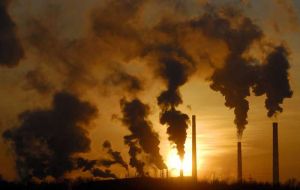MercoPress. South Atlantic News Agency
Greenhouse gas level reached all time high in 2007, says UN

Greenhouse gases, which drive global warming, continue to increase and carbon dioxide concentrations reached their highest level ever in 2007, according to a publication released Wednesday by the United Nations World Meteorological Organization, WNO.
The burning of fossil fuels and other human activities emit greenhouse gases, which warm the planet by trapping radiation within the atmosphere. WMO's 2007 "Greenhouse Gas Bulletin" found that the amount of carbon dioxide has risen 0.5 per cent from the previous year, while concentrations of nitrous oxide, another climate-warming substance, also reached record highs in 2006. In the past quarter century, carbon dioxide levels have soared 37%, with population growth and urban development propelling increased burning of fossil fuels such as oil and coal. Also contributing to the surging CO2 levels is the clearing of land for farming, which releases more of the gas into the air and slashes carbon uptake by the biosphere. The new report said it is too early to judge whether there is an upward trend in levels of methane, another greenhouse gas, whose concentrations have been fluctuating over the past decade. It also found that the amount of chlorofluorocarbons (CFCs), which are ozone-damaging chemicals, continue to drop, thanks to emissions reductions set under the UN's Montreal Protocol that entered into force in 1989. Meanwhile, a consortium including the UN Food and Agriculture Organization, FAO said on Wednesday that Africa could be absorbing more carbon dioxide from the atmosphere than the continent is releasing into it. CarboAfrica found that Africa contributes less than 4% of the global emissions from fossil fuels, but accounts for 17% and 40% respectively of gas emissions emanating from deforestation and fires. But the most important element is the balance between carbon captured through photosynthesis by Africa's forests and savannas and gas released into the atmosphere, the research project comprised of 15 institutions said. "Our evidence so far indicates that Africa seems a 'carbon sink,' meaning that it takes more carbon out of the atmosphere than it releases," said Riccardo Valenti, coordinator of CarboAfrica. "If confirmed, this implies that Africa contributes to reducing the greenhouse effect, thus helping mitigate the consequences of climate change."




Top Comments
Disclaimer & comment rulesCommenting for this story is now closed.
If you have a Facebook account, become a fan and comment on our Facebook Page!